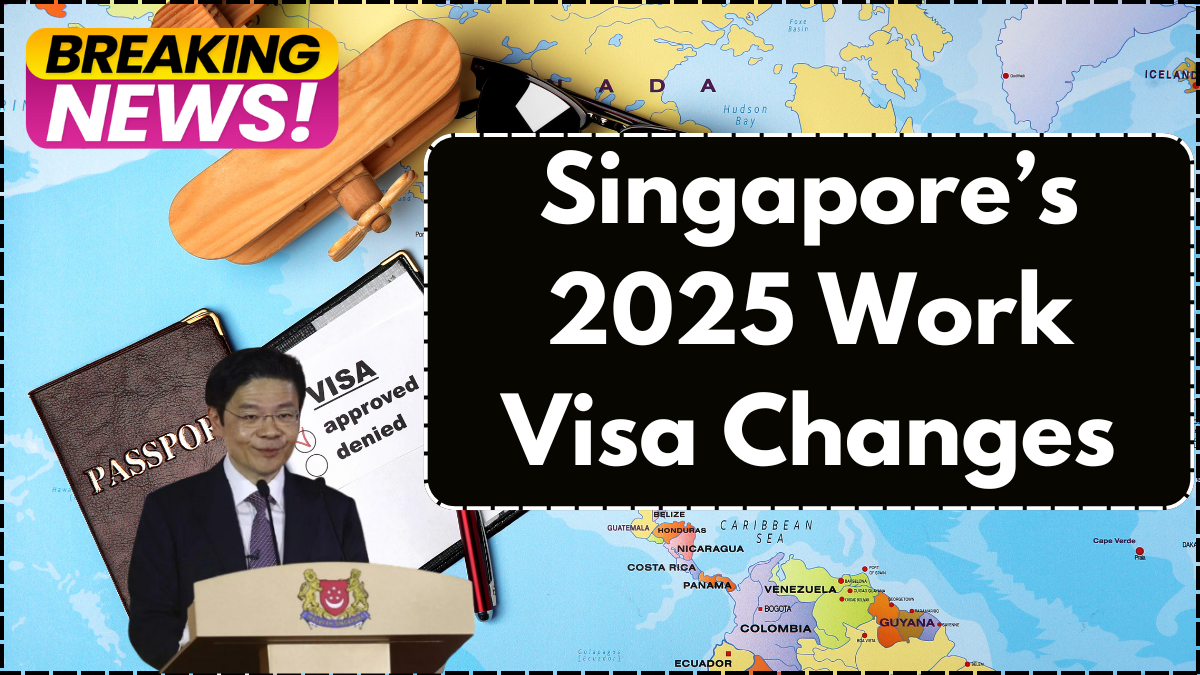Singapore has introduced major changes to its work visa policies, aiming to streamline application processes and attract highly skilled professionals globally. These revisions affect multiple visa types, eligibility criteria, and processing timelines. Whether you are a foreign worker seeking employment or an employer hiring international talent, staying informed about these updates is essential for a seamless transition into Singapore’s job market.
This guide provides an in-depth analysis of the recent modifications, application processes, and how they affect foreign workers and businesses in Singapore.

Overview of Singapore’s Work Visa Categories
Singapore offers multiple types of work visas based on the applicant’s skills, qualifications, and industry requirements.
1. Employment Pass (EP)
Designed for highly skilled foreign professionals, managers, and executives, the Employment Pass requires a minimum qualifying salary. As of 2025, the new salary threshold is S$5,600, with financial service professionals needing at least S$6,200.
2. S Pass
This visa is intended for mid-skilled workers in industries like healthcare, engineering, and manufacturing. Applicants must meet the required salary and qualification criteria, with employers applying on their behalf.
3. Work Permit
Aimed at semi-skilled and unskilled workers in sectors such as construction, manufacturing, and services, the Work Permit is issued for specific industries where local manpower is insufficient.
4. EntrePass
Entrepreneurs planning to establish businesses in Singapore can apply for an EntrePass. A detailed business plan demonstrating innovation, job creation, and economic contributions is a key requirement.
5. Personalised Employment Pass (PEP)
Designed for high-earning professionals, the PEP provides greater flexibility compared to the standard EP. Unlike other passes, it does not require employer sponsorship, allowing professionals to switch jobs without reapplying.
Also Read: Singapore $1,560–$1,670 CPF Monthly Payment April 2025: Eligibility, Dates & Full Guide
Key Changes Effective April 2025
Singapore’s government has introduced several reforms to make the country more attractive to global talent:
- Removal of Maximum Employment Period for Work Permit Holders – Foreign workers can now stay indefinitely, subject to employer sponsorship and regulatory compliance.
- Increase in Employment Age Limit – Experienced professionals now have extended opportunities to work in Singapore.
- Salary Threshold Adjustments – The EP salary requirement has risen from S$5,000 to S$5,600, while S Pass salary requirements have also been revised.
- Expansion of Eligible Occupations – More job roles in emerging industries, such as AI, fintech, and green energy, are now covered under EP and S Pass schemes.
Work Visa Application Process
The application process for Singapore’s work visas varies by category, as outlined below:
| Visa Type | Requirements | Processing Time |
|---|---|---|
| Employment Pass (EP) | Job offer, minimum salary of S$5,600, relevant qualifications | Up to 3 weeks |
| S Pass | Employer sponsorship, salary and qualification requirements | Around 3 weeks |
| Work Permit | Employer applies via MOM, specific industry requirements | Around 1 week |
| EntrePass | Business plan submission, innovative startup proposal | Around 8 weeks |
| Personalised Employment Pass (PEP) | High salary, no employer sponsorship needed | Up to 8 weeks |
Impact of Recent Policy Reforms on Foreign Workers
The recent policy updates aim to create a more stable and welcoming work environment for foreign professionals. Here’s how these changes affect different stakeholders:
- For Employers – Companies must ensure compliance with revised salary thresholds and job eligibility criteria while leveraging the flexibility offered by long-term Work Permits.
- For Skilled Professionals – Higher salary requirements may mean greater competition, but the expansion of eligible roles presents new opportunities.
- For Entrepreneurs – Stricter evaluation of business plans under the EntrePass encourages innovative startups with strong economic potential.
- For Semi-Skilled Workers – The removal of employment duration limits enhances job security, provided they meet industry-specific demands.
Conclusion
Singapore’s work visa reforms aim to enhance its global appeal while maintaining a structured and efficient immigration system. With increased opportunities for skilled professionals, entrepreneurs, and semi-skilled workers, these updates are set to shape the country’s labor market in the years ahead. Staying informed and preparing in advance will help you navigate the new regulations smoothly and secure a successful career in Singapore.
Frequently Asked Questions (FAQs)
1. How do I know which work visa is suitable for me?
The choice depends on your qualifications, industry, and job role. High-skilled professionals typically apply for an EP, while mid-skilled workers go for an S Pass.
2. What happens if my visa application is rejected?
You may appeal the decision by addressing the reasons for rejection and providing additional supporting documents.
3. Can I switch employers while holding a work visa?
Yes, but the new employer must apply for a new pass, except in the case of a Personalised Employment Pass (PEP), which allows job changes without reapplication.
4. Are salary thresholds expected to change in the future?
Singapore periodically reviews salary thresholds to reflect market conditions, so future adjustments are possible.
5. How can I expedite my visa application?
Ensure that all required documents are accurately submitted and work with an employer who follows proper application procedures.
For More Information Click Here
Akesh is a furniture expert with years of experience in design and craftsmanship. Specializing in sustainable materials, he shares his expertise to help people create stylish and functional living spaces.
